2017人教版八年级下英语现在完成时语法讲解
人教版八年级下学期英语语法讲解
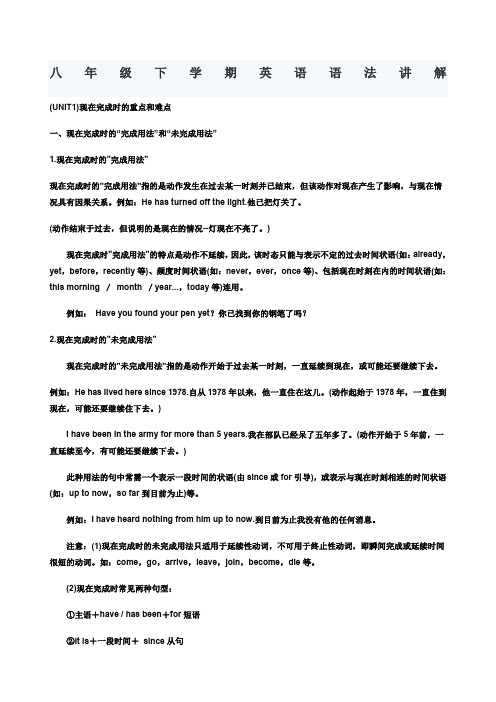
八年级下学期英语语法讲解(UNIT1)现在完成时的重点和难点一、现在完成时的“完成用法”和“未完成用法”1.现在完成时的"完成用法"现在完成时的"完成用法"指的是动作发生在过去某一时刻并已结束,但该动作对现在产生了影响,与现在情况具有因果关系。
例如:He has turned off the light.他已把灯关了。
(动作结束于过去,但说明的是现在的情况--灯现在不亮了。
)现在完成时"完成用法"的特点是动作不延续,因此,该时态只能与表示不定的过去时间状语(如:already,yet,before,recently等)、频度时间状语(如:never,ever,once等)、包括现在时刻在内的时间状语(如:this morning /month /year...,today等)连用。
例如:Have you found your pen yet?你已找到你的钢笔了吗?2.现在完成时的"未完成用法"现在完成时的"未完成用法"指的是动作开始于过去某一时刻,一直延续到现在,或可能还要继续下去。
例如:He has lived here since 1978.自从1978年以来,他一直住在这儿。
(动作起始于1978年,一直住到现在,可能还要继续住下去。
)I have been in the army for more than 5 years.我在部队已经呆了五年多了。
(动作开始于5年前,一直延续至今,有可能还要继续下去。
)此种用法的句中常需一个表示一段时间的状语(由since或for引导),或表示与现在时刻相连的时间状语(如:up to now,so far到目前为止)等。
例如:I have heard nothing from him up to now.到目前为止我没有他的任何消息。
注意:(1)现在完成时的未完成用法只适用于延续性动词,不可用于终止性动词,即瞬间完成或延续时间很短的动词。
八年级英语语法讲解-现在完成时

1. 用含ago等过去时间状语的一般过去时。 1) He left here three years ago. 2) She came back two days ago. 2. “It is +一段时间+since +一般过去时从句 ” 1) It is three years since he left here. 2) It is two days since he came back. 3.一段时间+has passed + since + 一般过去时从句 1) Three years has passed since he left here. 2) Two days has passed since she came back. 以上三种表示方法适用于所有瞬间动词。
终止性(瞬间)动词是指那些动作一次完成,不能 延续的动词。如:come, go, buy, die, join, begin等. 这些动词的肯定式不能和段时间状语连用。 终止性(瞬间) 动词可以用于现在完成时,但不能 和表示一段时间的状语连用。 如可说“He has left.‖ ―She has come back‖ 但不能说“He has left for three years.‖ ―She has come back for two days‖ 如果要表达: 1) 他已走了三年了. 2) 她已经回来两天了 可用以下几种表达法:
She has swum since half an hour ago. 我已经游泳了半个小时 (半个小时前已经开始游泳,到现在还在游)
主菜单
上一页
下一页
一段时间的表达方法有两种: for a year 1) for + 一段时间 for two weeks for three years
新目标人教版八年级下册第八单元语法现在完成时知识点解析
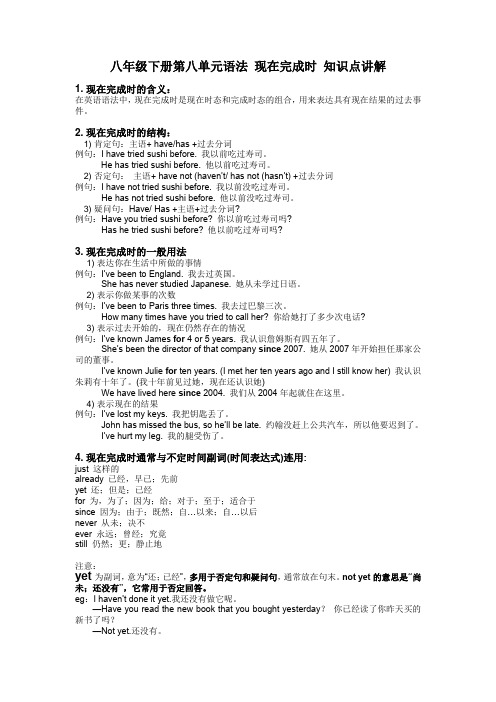
八年级下册第八单元语法现在完成时知识点讲解1. 现在完成时的含义:在英语语法中,现在完成时是现在时态和完成时态的组合,用来表达具有现在结果的过去事件。
2. 现在完成时的结构:1) 肯定句:主语+ have/has +过去分词例句:I have tried sushi before. 我以前吃过寿司。
He has tried sushi before. 他以前吃过寿司。
2) 否定句:主语+ have not (haven’t/ has not (hasn’t) +过去分词例句:I have not tried sushi before. 我以前没吃过寿司。
He has not tried sushi before. 他以前没吃过寿司。
3) 疑问句:Have/ Has +主语+过去分词?例句:Have you tried sushi before? 你以前吃过寿司吗?Has he tried sushi before? 他以前吃过寿司吗?3. 现在完成时的一般用法1) 表达你在生活中所做的事情例句:I’ve been to England. 我去过英国。
She has never studied Japanese. 她从未学过日语。
2) 表示你做某事的次数例句:I’ve been to Paris three times. 我去过巴黎三次。
How many times have you tried to call her? 你给她打了多少次电话?3) 表示过去开始的,现在仍然存在的情况例句:I’ve known James for 4 or 5 years. 我认识詹姆斯有四五年了。
She’s been the director of that company since 2007. 她从2007年开始担任那家公司的董事。
I’ve known Julie for ten years. (I met her ten years ago and I still know her) 我认识朱莉有十年了。
人教版八年级英语下册现在完成时讲解及练习
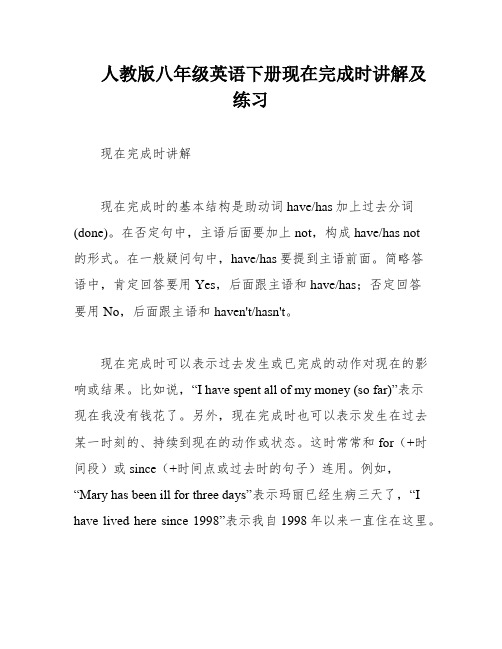
人教版八年级英语下册现在完成时讲解及练习现在完成时讲解现在完成时的基本结构是助动词have/has加上过去分词(done)。
在否定句中,主语后面要加上not,构成have/has not的形式。
在一般疑问句中,have/has要提到主语前面。
简略答语中,肯定回答要用Yes,后面跟主语和have/has;否定回答要用No,后面跟主语和haven't/hasn't。
现在完成时可以表示过去发生或已完成的动作对现在的影响或结果。
比如说,“I have spent all of my money (so far)”表示现在我没有钱花了。
另外,现在完成时也可以表示发生在过去某一时刻的、持续到现在的动作或状态。
这时常常和for(+时间段)或since(+时间点或过去时的句子)连用。
例如,“Mary has been ill for three days”表示玛丽已经生病三天了,“I have lived here since 1998”表示我自1998年以来一直住在这里。
现在完成时还有一些标志词,可以表达过去完成的动作对现在的影响。
这些标志词包括already、just和yet。
例如,“He has al ready got her help”表示他已经得到她的帮助,“He hasn't come back yet”表示他还没有回来。
This is the best film I have ever seen。
I have never seen a better movie before.He has never been to Beijing before。
He has never had the chance to visit Beijing.He says he has been to the USA three times already。
He has had the opportunity to visit the USA on three separate ns.So far。
人教版英语八年级下册(讲义)Unit 10——现在完成时 知识讲解
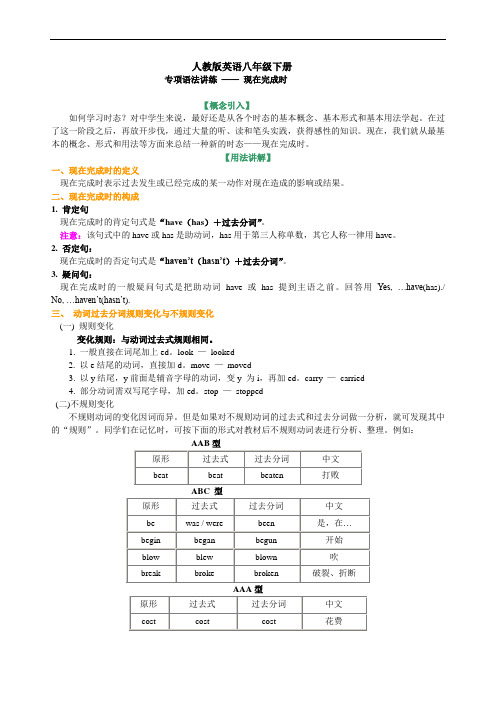
人教版英语八年级下册专项语法讲练——现在完成时【概念引入】如何学习时态?对中学生来说,最好还是从各个时态的基本概念、基本形式和基本用法学起。
在过了这一阶段之后,再放开步伐,通过大量的听、读和笔头实践,获得感性的知识。
现在,我们就从最基本的概念、形式和用法等方面来总结一种新的时态——现在完成时。
【用法讲解】一、现在完成时的定义现在完成时表示过去发生或已经完成的某一动作对现在造成的影响或结果。
二、现在完成时的构成1. 肯定句现在完成时的肯定句式是“have(has)+过去分词”。
注意:该句式中的have或has是助动词,has用于第三人称单数,其它人称一律用have。
2. 否定句:现在完成时的否定句式是“haven’t(hasn’t)+过去分词”。
3. 疑问句:现在完成时的一般疑问句式是把助动词have或has提到主语之前。
回答用Yes, …have(has)./ No, …haven’t(hasn’t).三、动词过去分词规则变化与不规则变化(一) 规则变化变化规则:与动词过去式规则相同。
1. 一般直接在词尾加上ed。
look —looked2. 以e结尾的动词,直接加d。
move —moved3. 以y结尾,y前面是辅音字母的动词,变y 为i,再加ed。
carry —carried4. 部分动词需双写尾字母,加ed。
stop —stopped(二)不规则变化不规则动词的变化因词而异。
但是如果对不规则动词的过去式和过去分词做一分析,就可发现其中的“规则”。
同学们在记忆时,可按下面的形式对教材后不规则动词表进行分析、整理。
例如:AAB型四、现在完成时的用法现在完成时表示过去某时发生的行为对主语目前产生的影响。
即用过去发生的某个行为来说明现在的某种情况。
例如:We are good friends. (现在的情况)我们是好朋友。
I knew him in 1997. (过去的动作) 我1997年认识了他。
人教版英语八年级下册现在完成时(易懂版本)
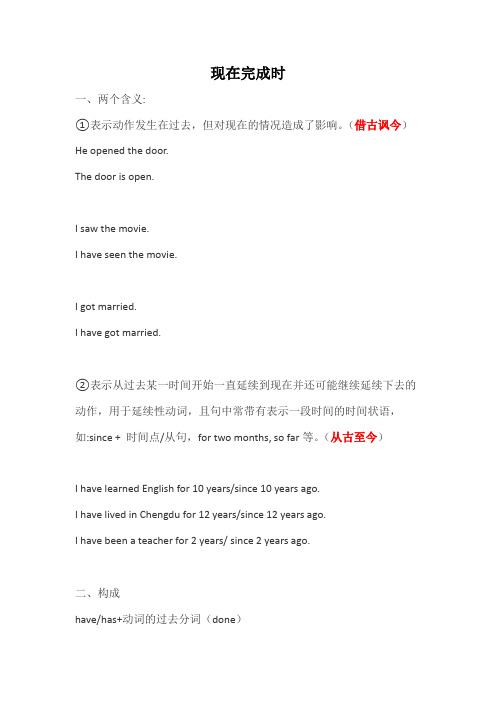
现在完成时一、两个含义:①表示动作发生在过去,但对现在的情况造成了影响。
(借古讽今)He opened the door.The door is open.I saw the movie.I have seen the movie.I got married.I have got married.②表示从过去某一时间开始一直延续到现在并还可能继续延续下去的动作,用于延续性动词,且句中常带有表示一段时间的时间状语,如:since + 时间点/从句,for two months, so far等。
(从古至今)I have learned English for 10 years/since 10 years ago.I have lived in Chengdu for 12 years/since 12 years ago.I have been a teacher for 2 years/ since 2 years ago.二、构成have/has+动词的过去分词(done)三、标志词for, since, already, yet, before, recently, over the …., in the past few…..四、already与yet的区别already用于肯定句(已经)yet用于否定句(还)和疑问句(已经)ever & neverever作副词,意为“曾经”,常用于现在完成时的一般疑问句和肯定句中,置于主语之后,过去分词之前。
never作副词,意为“从不;从未”,用于现在完成时中,表示否定,位于助动词have/has之后,过去分词之前。
五.have been to & have gone to & have been inhave been to 去了某地,已回have gone to 去了某地,未回have been in 在哪里待了多久后面是地点副词there、here、home 时,省略to六、延续性和非延续性1. 含义:延续性动词表示能够延续的动作,这种动作可以延续下去或产生持久影响。
现在完成时(unit8--unit10知识点总结)人教版英语八年级下册
现在完成时一.定义三要素与构成〔has/have done〕1.表示到现在为止已经完成或刚刚完成的动作。
By now, I have remembered 1000 English words.2.一件发生在过去的事情对现在产生影响。
常见时间状语:常和already〔已经〕,yet〔已经〕,just〔刚刚〕,still〔仍旧〕,so far〔到目前为止〕,till now,(直到现在),before〔以前〕,ever〔曾经〕,3 times(三次),in the past/last..years(在过去几年)I have spent all of my money so far.(1)already:〔已经〕用于确定句位置:放于助动词与done 之间或者放在句末(2)yet:疑问句〔已经〕否认句〔还〕位置:常放句尾(3)ever(曾经):疑问/确定位置:助动词与done之间(4)never〔从不〕位置:助动词与done之间【练习】〔1〕——你吃过早餐了吗?—Have you had breakfast ____?——是的,我已经吃过了。
/不,我还没吃。
—Yes,I have ________ had it./No,I haven’t had it ____.〔2〕I have ______ read this book,so I don’t know what it is about.〔3〕—Have you _____ been to the Great Wall? It’s so wonderful and great.—No,I have ______ been there.3.一个动作开头于过去,并持续到现在〔或许还将持续下去〕。
常见时间状语:①for+一段时间“长达/持续了……②since+过去一个时间点,表示“自从……以来〞时间段+ago,表示“从……以前〞+for+时间段从句〔一般过去时〕eg:Mary has been ill for three days.We have been classmates since 2 years ago.【练习】〔1〕我已经住在这里十年了。
人教版英语八年级下册第八单元:现在完成时语法
你已经读完这本书了么? yet 一般用于疑否句中,在句中意为“已经”;在否 定句中意为“还”通常放于句末。 如: Have you found the book yet ?
你已经找到那本书了么? Not yet . 还没找到。 She hasn’t finished her homework yet.
He _h_a_s_n_’_t __f_in_i_s_h_e_d__ his homework _y_e_t__. 3. Mum’s cooked the dinner. (改为否定句)
Mum _h_a_s_n_’t__ _c_o_o_k_e_d_ the dinner.
4.She joined the music club last week.( 改为现在完成时 ) She h_a_s_ _b_e_en__ _i_n___the music club __f_or__two weeks. 适当形式填空 5.He ____ha_s__le_ft____(leave ) the country and gone to India. 6.I have __be_e_n__(be )here for two months. 7.I’m waiting for my son . He __h_a_s_n’t__c_o_m_e_( not come )
---They have been here since 2008. Tom bought the car in 2009
---Tom have had the car since 2009.
语法加油站
一、句型转换。 1. I’ve already had dinner. (改为一般疑问句)
人教版八年级英语下册时态专讲-现在完成时讲解+练习
人教版八年级英语下册时态专讲:现在完成时讲解+练习一、现在完成时用法:表示过去发生或已经完成的动作对现在造成的影响或结果,或从过去某一时间开始一直延续到现在并且有可能还会持续的动作或状态。
由“have/has+过去分词”构成,主要有两个含义:①表示动作发生在过去,但与现在的情况有联系,有时无时间状语,有时和一些表示不确定的过去时间状语连用,如:many times,just,yet,ever,never,already,before,so far, by now等连用。
②表示从过去某一时间开始一直延续到现在并还可能继续延续下去的动作,用于延续性动词,且句中常带有表示一段时间的时间状语,如:since + 时间点/从句,for two months, so far等。
二、现在完成时基本结构:主语+have/has+过去分词(done)①肯定句:主语+have/has+过去分词+其他.②否定句:主语+have/has+not+过去分词+其他.③一般疑问句:Have/Has+主语+过去分词+其他.④特殊疑问句:特殊疑问词+一般疑问句(have/has+主语+过去分词+其他)?常与时间状语连用:just, already, yet, ever, never, before, several times.Already: “已经”; yet“仍然, 还”,这两个副词常常用于完成时态, 其中already常用于肯定句, yet常用于否定句和疑问句中。
如: Jim has already finished his work. Jim已经把他的工作做完了。
Mother hasn’t come home yet. 妈妈还没回来。
三、现在完成时一般过去时的区别:现在完成时表示的是与现在有关联的过去事件;而一般过去时则与现在毫无关系,只是单纯的过去的情况。
比较:I have lost my pen, so I have to buy one.我丢了钢笔,所以得去买一枝。
人教版八年级英语下册现在完成时讲解及练习
现在完成时讲解一.基本结构:助动词have/has+过去分词(done)二.句型:否定句:主语+have/has+not+过去分词+其他.一般疑问句:Have/Has+主语+过去分词+其他.简略答语:Yes,主语+have/has.(肯定)No,主语+haven't/hasn't.(否定)三.用法(1)现在完成时表示过去发生或已经完成的动作对现在造成的影响或结果I have spent all of my money(so far).(含义是:现在我没有钱花了.)Guo zijun has(just/already)come.(含义:郭子君现在在这儿)My father has gone to work.(含义是:我爸爸现在不在这儿)(2)现在完成时可以用来表示发生在过去某一时刻的,持续到现在的动作(用行为动词表示)或状态(be动词表示)常与for(+时间段),since(+时间点或过去时的句子)连用.①f or+时段②s ince+过去一个时间点(译为:自从……以来)③s ince+时段+ago④s ince+从句(过去时)●⑤I t is+时段+since+从句(过去时)Mary has been ill for three days.I have lived here since1998.四.has gone(to),has been(to),has been(in)的区别Have/Has gone(to):去了(现在不在说话现场)Where is your father?H e has gone to Shanghai.Have/Has been(to):去过(已不在去过的地方)My father has been to Shanghai.Have/has been in:呆了多久(还在所呆的地方)My father has been in Shanghai for two months./sin ce two months ago.五.现在完成时的标志1.现在完成时的含义之一是过去完成的动作对现在仍有影响,用以下四大标志词可以表达这种含义:*以already,just和yet为标志He has already got her help.他已得到她的帮助。
- 1、下载文档前请自行甄别文档内容的完整性,平台不提供额外的编辑、内容补充、找答案等附加服务。
- 2、"仅部分预览"的文档,不可在线预览部分如存在完整性等问题,可反馈申请退款(可完整预览的文档不适用该条件!)。
- 3、如文档侵犯您的权益,请联系客服反馈,我们会尽快为您处理(人工客服工作时间:9:00-18:30)。
现在完成时(I )语法知识定义:(1)表示过去发生或已经发生的动作对现在造成的影响或结果,这个影响和结果对现在还必须存在.常与already (已经),yet(已经,还),just (刚刚),ever (曾经),never 等词连用.already 常用于肯定句或疑问句(均表示:已经).yet : 常用于否定句(表示:还、尚),疑问句末尾(表示:已经). 现在完成时的构成及句型结构:(注:过去分词的变化分规则变化与不规则变化,规则变化与动词原形变过去式一样,不规则变化见教材137 页)1.肯定句:主语+have/has+ 过去分词+其他+时间.eg: I have already lost the key. 我已经弄丢了钥匙.(我现在没有钥匙)He has ever read that book ? 他曾经看过这本书.(了解书的内容)They have just cleaned their hands. 他们刚刚洗过手了.(手是干净的)2.否定句:主语+haven ' hasn't+ 过去分词+其他+时间.eg: I haven ' lost the key yet.He hasn'tever read that book .They haven'tjust cleaned their hands.3.—般疑问句:Have/Has+ 主语+过去分词+其他+时间?肯定回答:Yes, 主语+have/ has. 否定回答:No, 主语+haven t/hasn t. eg: Have you already lost the key? Yes, I have. No, I haven't.Has he ever read the book? Yes, he has. No, he hasnt. Have they justcleaned their hands? Yes, they have. No, they haven't.4.特殊疑问句:特殊疑问词+have/hasn 主语+过去分词+其他+时间?eg: What have you already done? (done 是do/does 的过去分词)What has he ever done?What have they just done?定义:(2)现在完成时表示从过去开始一直持续到现在还有可能继续持续下去的动作或状态。
eg: She has learned Englishor 5 years. (她已经学习五年英语了)解释:一直在学,持续了五年,并且还可能持续学下去.He has lived in Beijingsince he was born ? (自从他出生以后就居住在北京)解释:从出生后就一直住在北京,持续到现在,还有可能一直住下去)Have you stayed heresince 3 o ' clock? (自从 3 点后你就一直呆在这儿吗?)例题:选用for 和since 填空:1.W e haven' t seen each other ___ a long time.2. His father has been in the factory ___ 10 years ago.3. The film has been on 20 minutes. ____________________4. Mr. Green has worked here __________ he came to China.5. His grandparents have been dead __________________________________________ several years.6. It ' s five years _____________ we met last time7」have already had dinner. (否定) ____________ I _________ dinner .& Mum has cooked the dinner. Mum _______ ___________ the dinner.9.Susan has learned English at school. Susan _______ English at school.10.I have already had dinner. (提问)______________________________________ ?11.He has iust finished his homework. ______________________________________ ?12.Susa n has lear ned En glish at school. ____________________________ ?13.Mum has cooked the dinner. ______________________________________________ ?(3)现在完成时与一般过去时的区别:现在完成时属于现在时态的范围,不能和表示过去的时间状语连用,女口yesterday, last night, three weeks ago, in199 等.一般过去时只表示过去的动作或状态,和现在不发生关系。
一般过去时就可以和与表示—过去的时间状语连用.eg: I have already seen the film. (现在完成时,已经看了这部电影,并且知道电影的内容)I saw the film last week. (一般过去式,因为后面有表示过去的时间状语lastweel )He has lived here since 1993.(现在完成时,后面有since 引导的时间状语从句)He lived here in 佃93. (一般过去时,1993 年住在这儿,现在没住在这儿了)例题: 1. —__ you __ (clean) the room? Yes, we _______ (do) that already.2.W hen _____ you ______ (do) it? We _ (do) it an hour ago.3.___ he ____ (see) this film yet? Yes.4. When __ he ____ (see) it? He __ it last week.5. I _____ (read) the novel twice. It ' s in6e nigen _____ (give)up smoking last year.7. She ___ (go) to Pirs, hasn ' t shY^s. How __ she ___ (go) there? She ___ (go) there by air.现在完成时 (II )语法知识1. 构成:含有 be 动词的现在完成时的谓语部分由 构成,表示:曾经去过某地⋯ (been 是 be 的过去分词,不规则变化 )2. 基本句型:(1) 肯定句:主语 +have/has+ been + to+ 地点. eg : I have been toAustralia.They have been to Beijing.He has been to South Africa.(2) 否定句: 主语 +haven't/hasn' t + been + to+ 地点. eg: I haven 'been to Australia.They haven ' been to Beijing.eg : Where have you been?Where have theybeen?3. 用法:用来表示之前已经发生和完成度的动作与状态,其结果却和现在有联系 动作和 结果发生在过去,但它的影响现在还在 .可以和 never, ever, once, twice, three/four ???times 等 畐 U 词连用 .have/has+ been+ to+ 地点”(3) —般疑问句:肯定回答: Yes, 主语+ have/has.eg: Have you been toAustralia?Have they been to Beijing? Has hebeen to South Africa?(4)特殊疑问句:特殊疑问词 He hasn'tbeen to South Africa.Have/Has+ 主语 + been + to+ 地否定回答:主语 +haven t hasn't. Yes, I have. No. I haven t. ' Yes, they have. No, they haven ' .t Yes, he has. No, he hasn't.+have/has+ 主语+ bee neg: They have been to Chongqing twice I have never been to Sichuan.Has she ever been to Hainan?3I .h区av别e k:nown her since the n.eg: She has been to Shanghai. (她去过上海,已经回来了)She has gone to Shanghai. (她去了上海,还没有回来)(3) . have been in 表示“在某地呆了多少时间”,常与时间段状语连用eg: I have been in Shanghai for three years . 我至U 上海已有三年了。
He has been in London for half a month . 他来伦敦已有半个月了。
eg: The film has been on for ten minutes. 电影已经开始了10 分钟了。
例题:1? —Where is your brother? —He _____ the shop. He ' II be back soon.2.— _ you ever _____ to America —Yes, I _____ New York twice.3.—David _______ Australia. —I ' m sure has already arrived.4.——Is Benny here? —No, he ___ the school library. He left five minutes ago.4.Mike and his parents _________ the south for half a year.6.Mum is not at home now. she _________ the shop.7.You can ' t find him. H__ ____ Xi' an.8.Mr. Zhang ________ this school for ten years. He knows everyone here.9.Miss. Brown _______ China three times.10.I __________ the West lake, Look, I have taken many photos of it .11.Tom _________ Jim ' s home, but he hasn ' t come back.12.We __________ the bookshop and bought many books.13.My parents ________ Shandong for ten years.现在完成时(III ) 语法知识动词按其动作发生的方式,发生过程的长短可分为延续性动词与非延续性动词。
